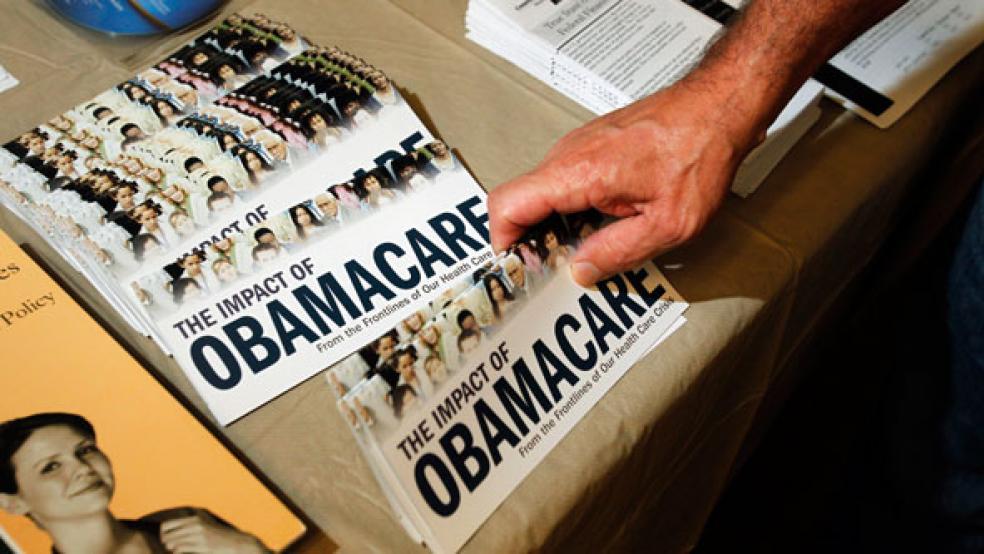Republicans failed spectacularly in their plan to use the budget and debt ceiling crisis to derail the implementation of Obamacare.
Their grand strategy led to a 16-day government shutdown—which was defused last week by a bargain to reopen the federal government and raise the debt limit through early next year, in return for a largely cosmetic tweak to the 2010 Affordable Care Act.
Now, ironically, the odds of portions of Obamacare getting delayed for a year look better than ever. The Tea Party could have won without their self-defeating protest, simply allowing the glitches to pile up after what appears to be an incompetent launch of the online insurance exchanges this month.
The myriad of obstacles raise questions as to whether the White House will be forced to push back deadlines and even postpone the tax penalty for Americans who forgo health coverage.
RELATED: OBAMACARE PREMIUMS ARE THE TIP OF CONSUMER COSTS
“There are so many key technical problems you can’t sum them up,” said Robert Laszewski, president of Health Policy and Strategy Associates, a policy and marketplace consulting firm. “I mean, it’s [Internet] architectural problems at the front end, it’s coding problems in terms of the inefficiency in the way the system works and wastes people’s time, and it’s screens that freeze. And then connections between insurance companies simply aren’t working.”
The president may look as though he emerged from the budget shutdown stronger, thanks to a profoundly fractured Republican caucus that fell under the sway of Tea Party types, including Ted Cruz. However, that newfound strength in the White House might easily turn out to be a mirage. The mushrooming series of technical problems are validating Tea Party criticisms of Obamacare.
Obama is expected to address the problems Monday as part of a health care event at the White House, according to the Associated Press. Cabinet members and other top administration officials will also be traveling around the country in the coming weeks to encourage sign-ups.
TECHNOLOGY COSTS HAVE TRIPLED…SO FAR
Meanwhile, the technology have tripled, as reported by Reuters. "Why this went from a ceiling of $93.7 million to $292 million is hard to fathom," said Scott Amey, general counsel at the Project on Government Oversight, a Washington, D.C.-based watchdog group that analyzes government contracting. "Something changed. It suggests they ran into problems and knew last spring that they couldn't do it for $93.7 million. They just blew through the original ceiling. Where was the contract oversight?"
Only a tiny pool of people has successfully navigated the virtual insurance markets that were created to service all 50 states and the District of Columba. The Congressional Budget Office estimated that the law would provide 15 million Americans with insurance this year, but the tech troubles suggest that enrollment could be a fraction of that figure.
Department of Health and Human Services officials and government contractors responsible for the design have been frantically tweaking the system in hopes of overcoming problems that originally were blamed on millions of people trying to log on in the early going – an excuse that even President Obama and congressional Democratic leaders have now dismissed.
Obama last Tuesday said that healthcare.gov had "way more glitches than I think are acceptable."
Those difficulties might be enough to undermine the entire program, unless the administration can swiftly correct them because a substantial mix of healthy young people signing up for insurance are essential to help pay for older and sicker people. In a sense, insurance premiums from healthier individuals subsidize the expenses for the unhealthy, helping to hold down total costs. Without the proper balance, insurance companies could take a financial beating and premiums would continue to spike.
“The biggest problem now is that the glitches and other technical problems will discourage all but the most eager applicants from signing up for insurance in the exchanges – meaning that older people with pre-existing medical problems will persist in applying while younger or healthier people will throw up their hands and give up,” said Joseph Antos, a health care expert with the American Enterprise Institute. “Without those younger, healthier people in the risk pool, insurance companies stand to lose a lot of money.”
In order to control insurance costs, the Obama administration estimates that 2.7 million young Americans must enroll through the exchanges for private coverage. The government helps to subsidize the cost of the insurance, but it would also charge a tax penalty for those without insurance.
For the first month alone, the Obama administration projected that nearly a half million people would sign up for the new health insurance markets, according to an internal memo obtained by The Associated Press.
ENROLLMENT FIGURES A MYSTERY
The administration has refused to release enrollment figures from the federal exchange that services 36 states. However, some independent experts peg the number as miniscule – and certainly a fraction of the half million projected by the administration. The Advisory Board, a research and consulting firm, has tracked enrollment through the 15 state-based exchanges, estimating that at least 50,082 people picked a plan and 183,088 had applied for coverage.
Right now, uninsured people have until Dec. 15 to sign up for coverage that would begin to take effect Jan. 1. That deadline may not be realistic if the computer glitches continue and many are forced to submit paper applications for insurance.
Yet extending the deadline is fraught with problems, because insurance companies would receive fewer months of premiums in 2014 than they had planned for when calculating their rates. Laszewski warns that delays in fully implementing Obamacare could last for many weeks or even months, depending on how serious the Internet problems are.
He urged Health and Human Services Secretary Kathleen Sebelius to bring in a top flight technology experts from the outside to assess the problems and recommend solutions.
“And so if that means taking it down for two months, you take it down for two months,” Laszewski said. “If that means taking it down for a year, you take it down for a year.
RELATED: WHY DIVORCE ATTORNEYS WILL LOVE OBAMACARE
“My concern is that the Obama administration is thinking about this in political terms, not operational terms,” he added. “If they take it down for a couple of months, the Republicans will win the news cycle for two frickin’ days. Who cares?”
A REAL REASON TO DELAY
Mark T. Bertolini, CEO at Aetna, told CNBC last week that the administration moved too quickly to launch the site before it had been adequately tested, and that if he had been in charge, “I would have” delayed implementation.
"I think the bigger issue is, will enough people sign up to make it work?" said Bertolini. Aetna, like other insurers, is counting on enough young and healthy people enrolling in the plans to offset the costs that come from providing benefits to older, sicker Americans.
Bertolini elaborated on how the system has failed: “When you implement a project of this size, the first thing you do is unit testing, then application testing, then you do integrated testing, then you do scalability testing, and then you do user testing. And that plan is usually a lot longer than some of the application development itself. That's happening on the fly. We didn't get code drops until about a month before the system went live.”
At this point, the more likely move would be to delay the individual mandate for one year. The Obama administration invited charges of hypocrisy when it delayed the employer mandate until 2015. Republicans argue it’s unfair to excuse businesses from providing health insurance but charge individuals a tax penalty for not carrying tax coverage.
There are concerns that the tax penalty, which scales up over time, is too small at $95 next year to force Americans to purchase insurance. The penalty – that will be imposed by the Internal Revenue Service -- is expected to raise $5 billion in 2015, when people pay their taxes for 2014, according to CBO estimates.
But with no penalty for being uninsured, some experts anticipate that the costs of insurance would increase as the healthy hang back from the system and the sick flood it.
The HousE Energy and Commerce Committee will hold a hearing on Thursday on the problems besetting Obamacare titled "Implementation Failures: Didn't Know or Didn't Disclose?" However, the administration says it will withhold enrollment data until next month. For now, administration officials are pretty much keeping a lid on its efforts at damage control.
“Nobody has any idea what’s going on behind the wizard’s curtain - literally,” Laszewski said. “So for any of us to make any kinds of projections as to how long it will take them to fix this is just impossible.”






